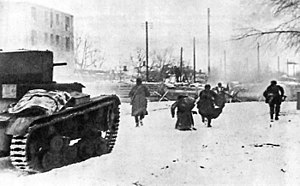This article needs additional citations for verification. (May 2007) |
| Battle of Rostov (1941) | |||||||
|---|---|---|---|---|---|---|---|
| Part of the Eastern Front of World War II | |||||||
 Soviet troops fighting in Rostov | |||||||
| |||||||
| Belligerents | |||||||
|
|
| ||||||
| Commanders and leaders | |||||||
|
|
| ||||||
| Strength | |||||||
| Casualties and losses | |||||||
|
33,000 (17 November–2 December)[1](including 27,000 combat casualties) |
Per German medical data only (incomplete data and excluding non-combat casualties): 1,141 killed 5,118 wounded 251 missing Total: 6,510 (11 November–30 November)[2] | ||||||

The Battle of Rostov (1941) took place on the Eastern Front of World War II around Rostov-on-Don and was fought between Army Group South of Nazi Germany and the Southern Front of the Soviet Union.
The battle comprised three phases: the German Sea of Azov Offensive Operation by Army Group South (General Gerd von Rundstedt) (begun on 12 September 1941),[3] the Soviet Rostov Defensive Operation (5 November 1941 – 16 November 1941) by the Southern Front (General Yakov Timofeyevich Cherevichenko), and the Rostov Offensive Operation (27 November 1941 – 2 December 1941) executed by the same Soviet Front.
After forcing their way across the Mius River on 17 November, the German forces captured 10,000 Soviet troops and took Rostov on 21 November. Six days later the Southern Front, reinforced with the newly raised 37th Army, counterattacked from the north and threatened to surround the overstretched German III Motorized Army Corps. Rundstedt then ordered a retreat to the Mius line from Rostov to prevent the encirclement. The Red Army retook Rostov on 28 November. It was the first successful major Soviet counteroffensive of the war. Hitler fired von Rundstedt on 1 December. Rundstedt's successor Walther von Reichenau confirmed the retreat order with the backing of the Army High Command Chief of Staff Franz Halder and Hitler relented (details here).
- ^ "ВЕЛИКАЯ ВОЙНА - Ростовская наступательная операция 1941 года". Archived from the original on 13 April 2009. Retrieved 8 January 2009.
- ^ "1941". Archived from the original on 31 May 2013. Retrieved 10 December 2017.
- ^ p.87, Haupt, Army Group South